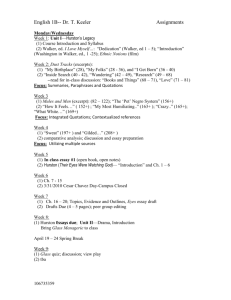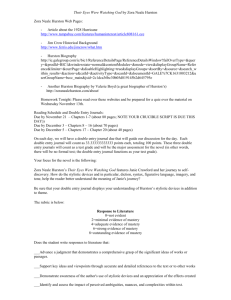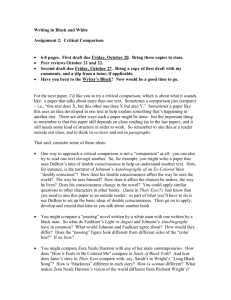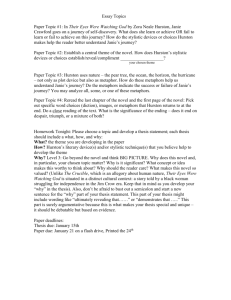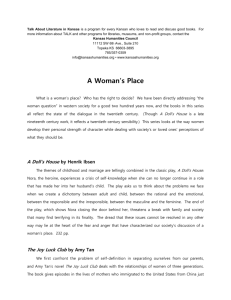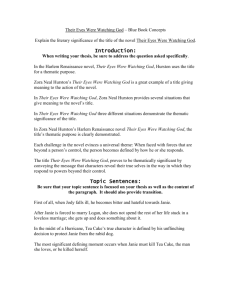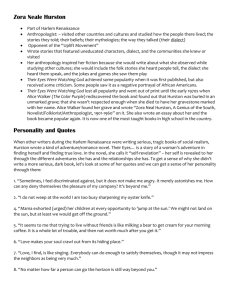Womanism as the key to understanding Zora Neale
advertisement
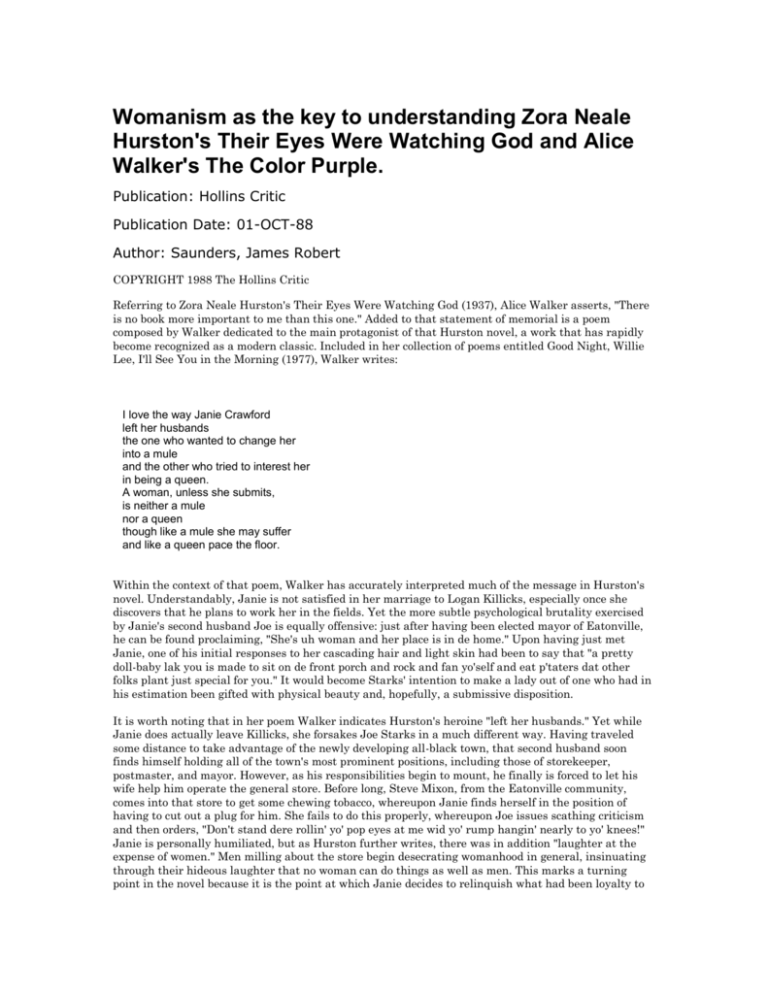
Womanism as the key to understanding Zora Neale Hurston's Their Eyes Were Watching God and Alice Walker's The Color Purple. Publication: Hollins Critic Publication Date: 01-OCT-88 Author: Saunders, James Robert COPYRIGHT 1988 The Hollins Critic Referring to Zora Neale Hurston's Their Eyes Were Watching God (1937), Alice Walker asserts, "There is no book more important to me than this one." Added to that statement of memorial is a poem composed by Walker dedicated to the main protagonist of that Hurston novel, a work that has rapidly become recognized as a modern classic. Included in her collection of poems entitled Good Night, Willie Lee, I'll See You in the Morning (1977), Walker writes: I love the way Janie Crawford left her husbands the one who wanted to change her into a mule and the other who tried to interest her in being a queen. A woman, unless she submits, is neither a mule nor a queen though like a mule she may suffer and like a queen pace the floor. Within the context of that poem, Walker has accurately interpreted much of the message in Hurston's novel. Understandably, Janie is not satisfied in her marriage to Logan Killicks, especially once she discovers that he plans to work her in the fields. Yet the more subtle psychological brutality exercised by Janie's second husband Joe is equally offensive: just after having been elected mayor of Eatonville, he can be found proclaiming, "She's uh woman and her place is in de home." Upon having just met Janie, one of his initial responses to her cascading hair and light skin had been to say that "a pretty doll-baby lak you is made to sit on de front porch and rock and fan yo'self and eat p'taters dat other folks plant just special for you." It would become Starks' intention to make a lady out of one who had in his estimation been gifted with physical beauty and, hopefully, a submissive disposition. It is worth noting that in her poem Walker indicates Hurston's heroine "left her husbands." Yet while Janie does actually leave Killicks, she forsakes Joe Starks in a much different way. Having traveled some distance to take advantage of the newly developing all-black town, that second husband soon finds himself holding all of the town's most prominent positions, including those of storekeeper, postmaster, and mayor. However, as his responsibilities begin to mount, he finally is forced to let his wife help him operate the general store. Before long, Steve Mixon, from the Eatonville community, comes into that store to get some chewing tobacco, whereupon Janie finds herself in the position of having to cut out a plug for him. She fails to do this properly, whereupon Joe issues scathing criticism and then orders, "Don't stand dere rollin' yo' pop eyes at me wid yo' rump hangin' nearly to yo' knees!" Janie is personally humiliated, but as Hurston further writes, there was in addition "laughter at the expense of women." Men milling about the store begin desecrating womanhood in general, insinuating through their hideous laughter that no woman can do things as well as men. This marks a turning point in the novel because it is the point at which Janie decides to relinquish what had been loyalty to Joe and stand up for herself. It is as though the author herself became a character in her fiction as "Janie took to the middle of the floor to talk right into Jody's face, and that was something that hadn't been done before." Thus Janie retaliates: "Stop mixin' up mah doings wid mah looks, Jody. When you git through tellin' me how tuh cut uh plug uh tobacco, then you kin tell me whether mah behind is on straight or not." "Wha--whut's dat you say, Janie? You must be out yo' head." "Naw, Ah ain't outa mah head neither." "You must be. Talkin" any such language as dat." "You de one started talkin' under people's clothes. Not me." "Whut's de matter wid you, nohow? You ain't no young girl to be gettin' all insulted 'bout yo' looks. You ain't no young courtin' gal. You'se uh ole woman, nearly forty." "Yeah, Ah'm nearly forty and you'se already fifty. How come you can't talk about dat sometimes instead of always pointin' at me?" "T'ain't no use in gettin' all mad, Janie, 'cause Ah mention you ain't no young gal no mo'. Nobody in heah ain't lookin' for no wife outa yuh. Old as you is." "Naw, Ah ain't no young gal no too' but den Ah ain't no old woman neither. Ah reckon Ah looks mah age too. But Ah'm a woman every inch of me, and Ah know it. Dat's uh whole lot more'n you kin say. You big-bellies round here and put out a lot of brag, but 'tain't nothin' to it but yo' big voice. Humph! Talkin' 'bout me lookin' old! When you pull down yo' britches, you look lak de change uh life." In this verbal exchange much of our attention is drawn to the unorthodox spellings, double negatives, and folk expressions making up black dialect. But the most important point Hurston wishes to make has to do with the manner in which Janie has responded to Joe's efforts to confine her to "her place." After twenty years of his mental abuse, she finally rejects the premise upon which he had conceived their marriage. Only in this sense has Janie actually left him, and unable ever to recover from the shock of her assertiveness, he dies from what the author tells us is some kind of kidney trouble. We will be reminded here of a more recent version of what has happened in that Hurston novel. But instead of Janie, this time the protagonist is Celie in Alice Walker's phenomenal bestseller The Color Purple, and instead of rural Florida, this time the setting is rural Georgia. Yet, between the pages of both novels are the circumstances of women pitted against predominant attitudes and against individuals who would control their very lives. Having, as a child, been regularly raped by her stepfather and later sold as so much chattel property, Celie subsequently winds up in the hands of another man who continues brutal treatment and is known to her as simply "Mr.--." For years, Celie maintains this man's household, raises his children, and is the passive party in their sexual relationship until she has had enough. Preparing to go to Memphis with two other women, Celie first listens and then joins in once Shug delivers the ultimatum. Celie is coming with us, say Shug. Mr.--'s head swivel back straight. Say what? he ast. Celie is coming to Memphis with me. Over my dead body, Mr.--say. You satisfied that what you want, Shug say, cool as clabber. Mr.-- start up from his seat, look at Shug, plop back down again. He look over at me. I thought you was finally happy, he say. What wrong now? You a low down dog is what's wrong, I say. It's time to leave you and enter into the Creation. And your dead body just the welcome mat I need. As was the case with Joe Starks, Mr.-- is humiliated. In fact, absolute shock is registered on the faces of all who sit at the dinner table. "Everybody look at her like they surprise she there," Walker has Celie write, describing what has happened in a letter to her long lost sister, Nettle. However, Celie has an answer for their stares. You was all rotten children, I say. You made my life a hell on earth. And your daddy here ain't dead horse's shit. Mr.-- reach over to slap me. I jab my case knife in his hand. This reaction might seem unnecessarily harsh; indeed quite a few black male critics have insisted that the novel should be dismissed for what they consider its too narrow presentation of black life. From a certain perspective, those male critics have a point. In Walker's novel, little if any attention is accorded the black middle class or the fact that some black men do treat their wives with great respect. Furthermore, it must be considered whether or not the exposure of Mr.--'s treatment toward Celie does more harm than good in a society where opportunities already have been taken advantage of to classify blacks as inferior. Still, it must be admitted that when violence, be it physical or psychological, threatens to destroy the very essence of an individual, extreme reactions are quite warranted. Sociologist Miriam Hirsch, in her book Women and Violence (1981), examines the various types of violence that have been perpetrated against women since the beginning of time, reminding us that even such brilliant philosophers as Socrates and Aristotle readily concluded that women were inferior human beings. That pattern of thought, as Hirsch explains it, continued its development in the theories of even so heralded a thinker as Sigmund Freud, who declared "biological determinism" to be the cause of female inferiority. When one considers that some of our most enlightened predecessors held such biased views, it is not too hard to understand how the masses of humanity reached similar conclusions. To a large extent the problem was one of who controlled the definitions. Having been denied this role for centuries, women have begun, especially in recent decades, to insist that control over their own lives belongs to them. In her controversial book entitled The Natural Superiority of Women (1974), Ashley Montagu writes, "The origin of the English word 'woman' indicates that the female's very right to social existence was determined in the light of her secondary relationship to the male, for the word was originally 'wifman,' that is, 'wife-man,' the wife of the man; in the fourteenth century the f was dropped and the word became 'wiman'." II At the beginning of her collection of essays entitled In Search of Our Mothers' Gardens, Walker astutely offers her own list of alternative definitions for the term "womanist." The most essential explanation is that the word refers to "outrageous, audacious, courageous or willful behavior." The emphasis is on "willful" because for so long, so many black women have not been considered to be in possession of their own free wills, and no small part of the problem has resided in the psyche of black men. While many of her attitudes about the role of women in society are indeed outdated, Janie's grandmother, in Their Eyes Were Watching God, is not wholly out of date when she tells her ward: Honey, de white man is de ruler of everything as fur as Ah been able tuh find out. Maybe it's some place off in de ocean where de black man is in power, but we don't know nothin' but what we see. So de white man throw down de load and tell de nigger man tuh pick it up. He pick it up because he have to, but he don't tote it. He hand it to his womenfolks. De nigger woman is de mule uh de world so fur as Ah can see. Nanny warns Janie about racism and sexism, but the grandmother is more specifically concerned about the position of black women at the bottom of the totem pole. In spite of this entreaty, though, Janie has to learn the lesson for herself, experiencing two marriages that resemble what life would be like in a prison. In Walker's novel we similarly observe Celie functioning as the object of control, deprived of the very letters that her sister, Nettie, had composed to answer Celie's own communications from behind the marriage wall. As was the case with Hurston's Janie, it is only after Celie has absorbed all she can take that she is compelled to stand up for herself and finally assert, "I'm pore, I'm black, I may be ugly and can't cook ... But I'm here." It is rather difficult to believe that the similarities in these two authors' works are mere coincidence. Born in Eatonville, Florida, at some unidentified point near the turn of the century, Hurston describes in her autobiographical Dust Tracks on a Road (1942) how she "used to climb to the top of one of the huge chinaberry trees which guarded our front gate, and look out over the world." Young Zora Neale was anxious to behold all that a full life might afford the individual. Further on in that autobiography the author tells us, "It grew upon me that I ought to walk out to the horizon and see what the end of the world was like." Similarly, in the very first line of her novel we are provided with the reflection that "Ships at a distance have every man's wish on board." Hurston then goes on to explain how some of those ships come in with the tide while others "sail forever on the horizon, never out of sight." Even those men who do not attain their dreams have at least at some point in their lives been able to envision themselves fulfilling their fantasies. At sixteen, that age when the search for identity is most profound, Janie slips out of her grandmother's house and imagines, "Oh to be a pear tree--any tree in bloom!" Janie envisions complete fulfillment; however, it must be noted that she identifies not with another person, but with a part of nature. As a "tree" she will be in possession of great strength, awesome beauty, and communion with the natural world. While perhaps not as autobiographical as Hurston was in the writing of her fictional masterpiece, Walker does project through the pages of The Color Purple a sense that she has found solutions that can be applied by women in general. Speaking through the voice of Shug, Walker advises: The thing I believe. God is inside you and inside everybody else. You come into the world with God. But only them that search for it inside find it. And sometimes it just manifest itself even if you not looking, or don't know what you looking for. Trouble do it for most folks, I think. As we learn of such things as the fact that Mary Agnes also was raped as a child, and that even women in Africa are oppressed by men, it necessarily follows that we must view the advice being offered in the book as having been designed to make women think about themselves in a manner different from former perceptions. Shug concludes, "I knew that if I cut a tree, my arm would bleed." Improbable as that might sound, we as readers do give it some thought, for when Celie retaliates against Mr.-- it does indeed appear that she has relied upon the supernatural both to guide and give her strength. She herself is now brutal in her admonitions as she "give it to him straight ... And it seem to come to me from the trees." If it can be said that The Color Purple is a book that is mainly about the oppression of women, then it can also be said that it is a work that maintains women's link to nature as a major element for freedom. III Born in rural Eatonton, Georgia, in 1944, Walker is well aware of the great impact that her southern heritage has had on her writing. More precisely, she has come to grips with a legacy that has been passed on by the earlier writer who serves as the later artist's spiritual predecessor. Posing as Hurston's niece, Walker actually ventured, in August of 1973, to central Florida, first to Eatonville and then to Fort Pierce, where Hurston is buried. In a heartwrenching and most bizarre essay written for Ms. magazine and entitled "Looking for Zora," Walker reports on the visit to Eatonville and tells of her encounters with several of the local townspeople who knew both Hurston and her family. Walker was surprised to learn that Hurston wasn't buried at her home. Instead she had been laid to rest at Fort Pierce in what Walker discovered as a cemetery that looked "more like an abandoned field." The "niece" goes on to describe how "weeds choke the dirt road and scrape against the sides" of her car. And then we are shocked by the stunning information that Walker is "used to the haphazard cemetery-keeping that is traditional in most Southern black communities, but this neglect is staggering." We will be struck by the unfortunate circumstances of Hurston's demise, but Walker, perhaps more than most, can feel the agonizing pain of knowing that this writer in particular was buried in an unmarked grave. Walker has been justly critical of those who would suggest that this is no disturbing fate. Poor people frequently have received far less respect than that when earthly time has ended for them. But for one who is quite possibly the greatest black woman writer that this world has ever known, such circumstances do seem out of place. In the foreword to Robert Hemenway's Zora Neale Hurston: A Literary Biography, Walker writes of her efforts to locate and mark Hurston's grave. "It was, rather, a duty I accepted as naturally mine--as a black person, a woman, and a writer--because Zora was dead and I, for the time being, was alive." Walker's action in finding and marking Hurston's grave is comparable to the dead artist's own devotion to her craft in spite of many obstacles. As Walker was destined to be later, Hurston already had been a woman who was both black and an artist. Barriers to be overcome are prominent in Hurston's autobiography where, for example, she writes of "the real love affair of my life." Hurston confides: He begged me to give up my career, marry him and live outside of New York City. I really wanted to do anything he wanted me to do, but that one thing I could not do. It was not just my contract with my publishers, it was that I had things clawing inside of me that must be said. I could not see that my work should make any difference in marriage. He was all and everything else to me but that. In many ways that passage epitomizes the dilemma experienced by quite a few women in America as they have contemplated how they might best bridge the gap between women's traditional role in society and the individual's urge to develop herself outside the bonds of motherhood and marriage. Upon being asked whether or not she believed that women should have children, Walker has responded with a "yes" and then the qualification, "but no more than one because then the woman becomes a sitting duck" subject to diverse forms of manipulation. Walker indeed has had one child herself, a daughter who was raised simultaneously as the artist worked at her craft. On the other hand, Hurston remained childless throughout both of her marriages. In fact, after having been married for only a matter of months, in 1927 to Herbert Sheen, she immediately had second thoughts, and as Hemenway says, "By January, 1928, her relations with Sheen had been broken off, and there was only intermittent, perfunctory communication before the divorce on July 7, 1931." Hurston would marry again in 1939, only to divorce once more before a year had ended. Hemenway enlightens us: "One cannot overemphasize the extent of her commitment" to her literary work. If such was the case then society owes Hurston a tremendous debt. Long before the notion of equal rights for women became fashionable, Hurston already was living in accordance with an inner light. At a time when most men felt that women should primarily provide homebound nurturing for the family, Hurston was declaring, through her lifestyle and her work, that women should do anything they want. In another era Hurston might have been a literary legend in her lifetime; instead, she died in relative obscurity at a Florida welfare home, based on what Walker has been able to ascertain, from either malnutrition or a stroke. Commenting on a rejection letter received by Hurston after she had submitted one of her later manuscripts, Hemenway laments that it "indicates the personal tragedy of Zora Neale Hurston: Barnard graduate, author of four novels, two books of folklore, one volume of autobiography, the most important collector of Afro-American folklore in America, reduced by poverty and circumstance." It is not so difficult to understand why Walker was compelled to find the whereabouts of Hurston's final resting place. IV From a certain perspective, the two writers are like sisters. Walker mentions that when looking for Hurston's grave, she searched and searched before finally reaching a point where there was "only one thing to do." In the midst of that desolate Florida setting, it occurred to Walker that having come this close she need only cry out for acknowledgement. "Zo-ra!" she screamed and suddenly her "foot sinks into a hole." Perhaps by some act of supernatural intervention, Hurston had "reached out" to join in communion with one who was of the same mind as she. This brings us to the point of once again considering the poem that Walker wrote in memory of Hurston's Janie Crawford. It has been noted that the poem's heroine left Logan Killicks, but her departure from Joe Starks was much more profound than mere physical leavetaking. However, even more peculiar is the fact that Hurston's character Tea Cake is not mentioned as the poet Walker tells how Janie "left her husbands." Nevertheless Tea Cake is the most significant male in Hurston's novel, being the type of natural man who seems to love Janie for herself. He and Janie work and play together, sharing their lives almost completely. Still, this presumably perfect man can strike his wife, and so she has to kill him in the end, although Hurston has made the development ambiguous by first having a rabid dog bite this third husband, causing him to go insane. Hurston has forced us, through Janie's act of self-defense, to take in the fact that some married women have had no recourse but to save themselves by violent reaction. Walker, in her own novel, has kept the sense of ambiguity by having so entirely lopsided a character as Mr.-- go through essential change. In a letter written years after she has left her husband, Celie tells Nettle "when you talk to him now he really listen, and one time, out of nowhere in the conversation us was having, he said Celie, I'm satisfied this the first time I ever lived on Earth as a natural man." In spite of this turnaround in personality, however, Celie dares not marry him again, rejecting his proposal for a union that he claims will this time have a basis that is spiritual. There is a resemblance between this rehabilitated Mr.-- and the natural man, Tea Cake, that Hurston provides for Janie. In fact, one might well surmise that progress has been made. After prospects for remarriage on the parts of Celie and Mr.-- have long since been ended, we find the two characters sitting and sewing together for companionship. Mr.-- confides, "I use to try to sew along with mama cause that's what she was always doing. But everybody laughed at me." It becomes obvious that he has been as much a victim of his "cultural" surroundings as Celie has been. At the very end of The Color Purple, there is a July Fourth celebration, attended by those we can regard by now as Celie's friends. Harpo, Mary Agnes, Sofia, and even Mr.-- are there to help welcome Nettle and her family back home. Nettie's stepdaughter, Tashi, who is actually Celie's child sold by Celie's stepfather, appears in native African costume and draws instant admiration. Questions ensue naturally, and the welcoming assemblage inquires, "What your people love best to eat over there in Africa?" Taken aback by all the hoopla, Tashi answers, "barbecue," and says this word with emphasis. The specification of barbecue is most significant. At the very end of her autobiography, Zora Neale Hurston had brought all the details of her life to a prophetic close as she forgave faults and offered no apologies. Speculating about the prospects for a better world, this Harlem Renaissance phenomenon concluded, "Maybe all of us who do not have the good fortune to meet, or meet again, in this world, will meet at a barbecue." The celebratory aspect of life intrigued both writers. Hurston admitted that work made her happy, and from the wealth of literary material that Walker has thus far created, it can only be surmised that she likewise has found artistic joy. V It is most appropriate to remember Hurston as both a folklorist and a novelist. Her first collection of folklore, entitled Mules and Men, was published in 1935, and Hemenway comments, "Its publication was historically important, the first book of Afro-American folklore collected by a black American to be presented by a major publisher for a general reading audience." A product of extensive research conducted in Florida and Louisiana during the years between 1927 and 1932, that volume continues to garner wide respect in literary circles. Of comparable significance is the contribution she has made in fiction. The author of numerous short stories, she came into her own as a novelist with the appearance of Jonah's Gourd Vine in 1934. This first novel is in many ways autobiographical in that it gives a fictionalized account of Hurston's parents' marriage, her mother's death, and the father's subsequent remarriage to a woman who would cause the future writer to leave home at age fourteen. Nevertheless, it is the awe-inspiring Their Eyes Were Watching God that has sealed Hurston's place in arts and letters. The tale of Janie Crawford is one that was not fully appreciated during the 1930s when women were to a large extent still controlled by chauvinistic attitudes. Now, however, this landmark novel is accepted for what it is--a cornerstone in literary history. Notwithstanding the efforts of earlier writers such as Virginia Woolf and Nella Larsen, Carolyn Heilbrun, in Reinventing Womanhood (1979), has remarked that "women writers, like successful women in male-dominated professions, have failed to imagine autonomous women characters." One might wish to dismiss that remark as having come from the pen of one who has not studied past works carefully. On the other hand, it is useful to consider that the critic was generalizing so as to make her point more clearly. In On Lies, Secrets, and Silence, which interestingly enough came out the same year as Heilbrun's book, Adrienne Rich further observes: For writers, and at this moment for women writers in particular, there is the challenge and promise of a whole new psychic geography to be explored. But there is also a difficult and dangerous walking on the ice, as we try to find language and images for a consciousness we are just coming into, and with little in the past to support us. Suffice it to say, Hurston was way before her time as she utilized folklore to assist her in the charting of a path for women's progress. However, Hurston's powers waned and by the time Charles Scribner's Sons published Seraph on the Suwanee in 1948, it was evident that her greatest work was behind her. Even Walker maintains that Hurston's art "became reactionary, static, shockingly misguided and timid." Such was the fate of one who had offered female independence as necessary at a time when many others accepted that a woman's place was in the home. What Hurston had advocated in Their Eyes Were Watching God was the right of women to choose directions for themselves. "Perhaps the most important choice," say sociologists Joan Huber and Glenna Spitze, "is the ability to leave a man who will not do his share." Regardless of the changing times, there are many women who remain helplessly bound in unfulfilling matrimony. Financial dependence entraps some while others simply believe that any man is better than no man at all. It is this latter psychological phenomenon against which Hurston railed the most as she wrote her portrayal of Crawford's three fateful unions. VI Before the publication of her bestselling novel, The Color Purple, Walker was a well established poet who, as Hurston had done with folklore and fiction, depicted the circumstances of blacks in her native South. One such portrait, entitled "Women," is included in Revolutionary Petunias and Other Poems (1973). They were women then My mama's generation Husky of voice--Stout of Step With fists as well as Hands How they battered down Doors And ironed Starched white Shirts How they led Armies Headragged Generals Across mined Fields Booby-trapped Ditches To discover books Desks A place for us How they knew what we Must know Without knowing a page Of it Themselves. What we are provided with in that poem is a look back at the role black women played in maintaining their households and a sense of family. Washing sometimes for white families as well as their own children, they were a constant source of stability and they kept the flicker of hope alive when weaker souls deserted. As a matter of fact, Walker's first novel, The Third Life of Grange Copeland (1970), chronicles the life of a black man from Georgia who decides to leave home and venture north, only to learn that the North is not the "promised land" he had expected. Upon returning south to the woman who looked at him "with eyes that said she'd die on the spot if he wanted her to," he finds he is accepted in spite of his wanderings. In that work women are portrayed as being subject to male whim and fancy. While Walker's second novel, Meridian (1976), allows women to fare much better than they had in The Third Life, the ending is still problematic. The heroine, Meridian, is prone to engage in stern protest against social ills, but then immediately collapses into a coma-like state because these strenuous acts are not completely natural. Even after she has experienced the torment of continuous male deception, it is not certain that she can survive the search for her own self. It is finally through The Color Purple's Celie that we gain access to the flowering of womanhood lacking in the two previous novels. In fact, Celie has a universal value. She symbolizes how essential it is for all of us to find out who we are as a prerequisite to know where we are going. Books by Zora Neale Hurston JONAH'S GOURD VINE Philadelphia: J.B. Lippincott, 1934. Reprinted, J.B. Lippincott, 1971. MULES AND MEN Philadelphia: J.B. Lippincott, 1935. Reprinted, Indiana University Press, 1978. $8.95, pa. THEIR EYES WERE WATCHING GOD Philadelphia: J.B. Lippincott, 1937. Reprinted, Urbana: University of Illinois Press, 1978. $6.95, pa. TELL MY HORSE Philadelphia: J.B. Lippincott, 1938. Reprinted, Berkeley: Turtle Island Foundation, 1981. $12.95, pa. MOSES, MAN OF THE MOUNTAIN Philadelphia: J.B. Lippincott, 1939. Reprinted, Urbana: University of Illinois Press, 1984. $8.95, pa. DUST TRACKS ON A ROAD Philadelphia: J.B. Lippincott, 1942. Reprinted, Urbana: University of Illinois Press, 1984. $8.95, pa. SERAPH ON THE SUWANEE New York: Charles Scribner's Sons, 1948. Reprinted, New York: AMS Press, 1974. $24.50. THE SANCTIFIED CHURCH Berkeley: Turtle Island Foundation, 1983. $9.95, pa. SPUNK: THE COLLECTED SHORT STORIES OF ZORA NEALE HURSTON Berkeley: Turtle Island Foundation, 1985. $9.95, pa. THE GILDED SIX-BITS Minneapolis, MN: Redpath Press, 1986. $4.95, pa. --H.D. Books by Alice Walker THE THIRD LIFE OF GRANGE COPELAND Harcourt, Brace Jovanovich, 1971. $15.95 Reprinted, Harcourt, Brace Jovanovich, 1977. $4.95 pa. REVOLUTIONARY PETUNIAS AND OTHER POEMS New York: Harcourt Brace Jovanovich, 1973. $4.95, pa. LANGSTON HUGHES, AMERICAN POET New York: Harper and Row, 1974. $12.83. THE LIFE OF THOMAS LODGE New York: Folcroft, 1974. $16.50 IN LOVE AND TROUBLE: STORIES OF BLACK WOMEN New York: Harcourt Brace Jovanovich, 1974. $3.95, pa. MERIDIAN New York: Harcourt Brace Jovanovich. 1976. $14.95, $3.95, pa. ONCE New York: Harcourt Brace Jovanovich, 1976. $3.95, pa. I LOVE MYSELF WHEN I AM LAUGHING ... & THEN AGAIN WHEN I AM LOOKING MEAN & IMPRESSIVE: A ZORA NEALE HURSTON READER Old Westbury, New York: Feminist Press, 1979. $9.95, pa. YOU CAN'T KEEP A GOOD WOMAN DOWN New York: Harcourt Brace Jovanovich, 1982. $4.95, pa. THE COLOR PURPLE Women's Press, 1983. $6.95, pa. IN SEARCH OF OUR MOTHERS' GARDENS: WOMANIST PROSE New York: Harcourt Brace Jovanovich, 1983. $14.95. GOOD NIGHT, WILLIE LEE, I'LL SEE YOU IN THE MORNING: POEMS New York: Harcourt Brace Jovanovich, 1984. $4.95, pa. HORSES MAKE LANDSCAPE LOOK MORE BEAUTIFUL New York: Harcourt Brace Jovanovich, 1984. $10.95, $3.95, pa. TO HELL WITH DYING New York: Harcourt Brace Jovanovich, 1988. --H.D. Zora Neale Hurston (1891-1960) The fifth of eight children raised in the rural south, Zora Neale Hurston was the author of seven books, numerous short stories, articles and plays. Educated at Howard University, Barnard and Columbia, she was the recipient of Guggenheim Fellowships in 1936 and 1938. Folklorist, anthropologist and novelist, she acted as a major contributor to the Harlem Renaissance and from 1930 to 1960 was one of the most accomplished black women writers in America. --H.D. Alice Walker Born into a sharefarming family in Eatonton, Georgia, on February 9, 1944, Alice Walker is the author of numerous books of poetry, fiction and criticism. A major voice among black and women artists today, she received her education at Atlanta's Spelman College for Women and Sarah Lawrence College. She has served as editor for Ms. magazine, received a Guggenheim Fellowship in 1977, and has contributed articles to publications such as Black Scholar, New South, Ms. and The New York Times. --H.D. Specializing in black literature, James Robert Saunders is an assistant professor of English at The University of Toledo.
